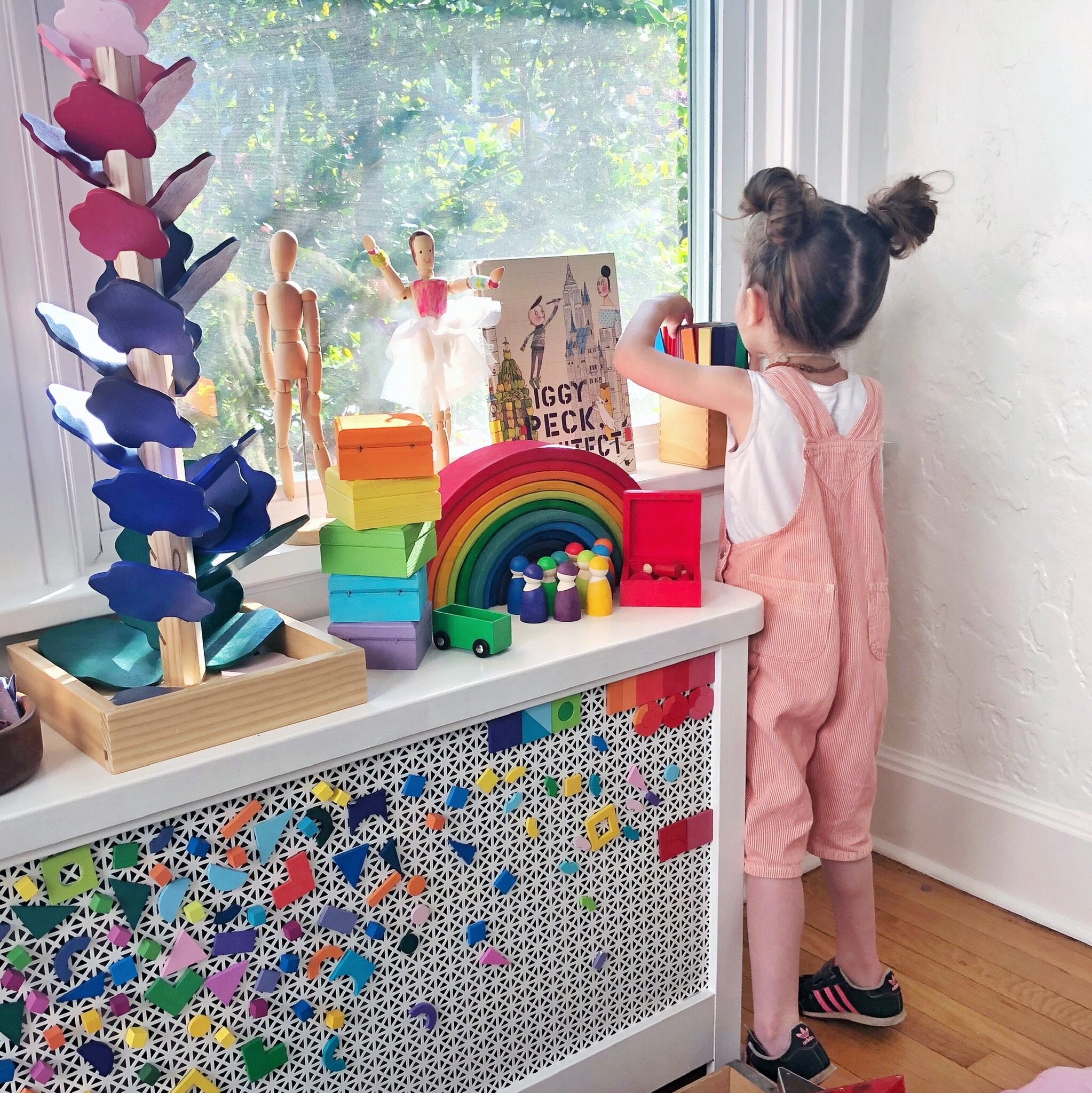5 Ways to Play with Your Toddler Now to Lay the Foundation for Independent Play Later
/It seems like everywhere we turn, there’s an expert talking about independent play and why it’s so important for our children. Whether you are worried about relying too much on screens, or you just need to find some of that elusive me-time, independent play is good for the well being of the entire family, not just your child. But, implementing independent play can be overwhelming and confusing for parents. It’s okay to play with your child, but you don’t have to do it every time they ask. If your child is in a “play with me” stage, here are five simple yet powerful ways you can foster that independence, while still enjoying quality time together.
(scroll to the bottom for a list of open-ended toys for babies and toddlers)
1. Copy What They Do. Be A Mirror.
Have you ever noticed how your toddler lights up when you mimic their actions? Whether they knock down a tower with a burst of laughter or bang two blocks together with determination, mirror their behavior. Copying what they do might seem simple, but it holds deep significance. When you imitate their actions, you’re telling them, “I see you. What you’re doing matters.” This validation builds their sense of security, and with it comes the confidence they need to explore independently later. It’s like planting a seed of reassurance that will help them bloom into independent play.
2. If They Loved A Certain Toy Yesterday, Play With It Again Today.
If your little one was all about that stackable ring toy yesterday, guess what? It’s totally fine to pull it out again today! Repetition is crucial in toddlerhood. Playing with the same toy over and over allows toddlers to practice, master skills, and gain control over their environment. There’s comfort in the familiar, and through that comfort, they’re building the confidence they’ll need for independent play. So go ahead and hit replay on those favorite toys - they're helping your child’s brain grow in all the right ways.
3. Narrate Their Play
Imagine a play-by-play commentator, but for your toddler’s block tower building or pretend tea party. “You’re stacking the blue block on top of the red one. Look how tall it’s getting!” Narrating what they’re doing doesn’t just make you sound like a doting parent (which, of course, you are), it actually helps your toddler develop language skills and focus. Describing their actions brings awareness to their play and encourages them to stay engaged longer. Bonus: they’re also learning new words, so you’re helping with language development at the same time.
4. Gradually Increase Distance
We all know that toddlers love to have you nearby, but you can start building independence by slowly increasing the distance between you during playtime. Start by sitting right beside them while they play. Once they’re comfortable, inch away bit by bit - maybe to the other side of the room. They’ll still feel the security of having you close, but they’ll also begin to experience the joys of independent play. It's like giving them tiny doses of freedom, little by little.
5. Create an Inviting Play Space
Having a designated play area with age-appropriate toys within reach can work wonders for encouraging independent play. Think of it as your child’s personal creative zone. When they know where to find their toys and can access them easily, it empowers them to start playing on their own. Plus, a well-organized play space fosters a sense of order, and a little structure can help ease the transition into independent playtime.
Independent play won’t happen overnight, but with patience and a few of these simple strategies, you’ll be laying the foundation for a more child-directed solo play to come. Hang in there, and don’t forget to celebrate the small wins - both yours and theirs.
Check Out Our EBooks
The Play Plan
The Play Plan is an ebook containing play invitations that are easy to set up, inexpensive, and apply children of all ages. The 25 play prompts are divided into five categories and use items that you most likely already have at home. These play prompts consider children of all ages, all developmental stages, and all learning capabilities. Each prompt can be tailored to fit your unique child’s needs. Play is meant to be simple.
The Parent’s Handbook For Starting Preschool
Starting school is a huge milestone. It can bring up so many feelings for both child and parent. I have been on “all sides” of starting school. I taught preschool for many years, I have a Masters in education, and I’m a mom of three children who all approached starting school differently. I’ve been working with children and families for a very long time and one thing I know for sure is that starting school for the first time brings up a lot of feelings for everyone involved. Inside this ebook, I am going to walk you through all of the tips and strategies that I have used throughout the years. You don’t have to wing it. After A Parent’s Handbook for Starting School, you and your child are going to feel as prepared and confident as possible for starting school.










How to handle transitioning back to school and all of the emotions that come along with it.